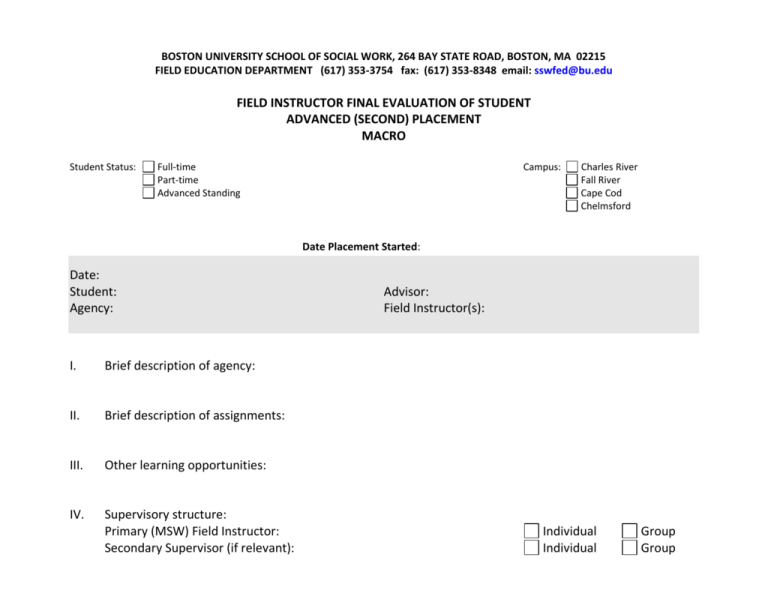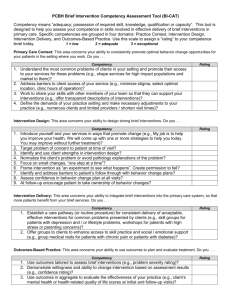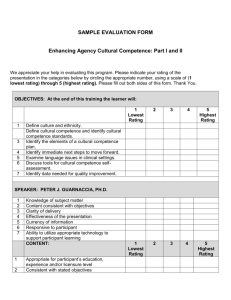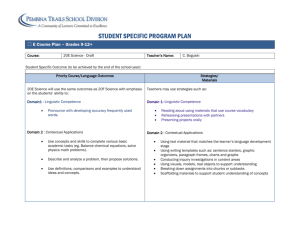BOSTON UNIVERSITY SCHOOL OF SOCIAL WORK, 264 BAY
advertisement

BOSTON UNIVERSITY SCHOOL OF SOCIAL WORK, 264 BAY STATE ROAD, BOSTON, MA 02215 FIELD EDUCATION DEPARTMENT (617) 353-3754 fax: (617) 353-8348 email: sswfed@bu.edu FIELD INSTRUCTOR FINAL EVALUATION OF STUDENT ADVANCED (SECOND) PLACEMENT MACRO Student Status: Full-time Part-time Advanced Standing Campus: Charles River Fall River Cape Cod Chelmsford Date Placement Started: Date: Student: Agency: I. Brief description of agency: II. Brief description of assignments: III. Other learning opportunities: IV. Supervisory structure: Primary (MSW) Field Instructor: Secondary Supervisor (if relevant): Advisor: Field Instructor(s): Individual Individual Group Group Directions for completing evaluation tool. The following categories are based on a multidimensional framework for assessing the student’s competence which takes into account the following dimensions of performance: consistency; quality; level of Independence; time needed to accomplish tasks; steady progress; integration of knowledge, value and skills; ability to transfer learning from one activity to another. Each of the specific bulleted items should be evaluated using the competency rating scale and an overall competency rating should be given for each competency. By the end of the placement students are expected to achieve an overall rating of “competence” (at a minimum) in all ten competencies. Individual bulleted items under each competency may be rated as “emerging competence” or even an occasional “pre-competence” as long as the overall rating is “competent”. Clear evidence should be provided to support all ratings. PC Pre Competence Does not or rarely demonstrates and integrates values, knowledge and skills; needs constant supervision; quality of work uneven; tasks not completed in reasonable time; knowledge/skills not transferred from one assignment to another; progress uncertain EC Emerging Competence Beginning to demonstrate values, knowledge and skills; integrates and applies learning from one activity to another inconsistently or inappropriately some of the time; requires regular supervision; progress is evident; learning is becoming more efficient; quality of work uneven but moving in a positive direction C Competence Usually demonstrates and integrates values, knowledge and skills with sufficient mastery and independence; uses supervision for consultation appropriately, appropriately applies learning from one activity to another; uses time well to accomplish tasks and assignments; ready to move to advanced placement or beginning practitioner level AC Advanced Competence Consistently demonstrates, integrates and applies values, knowledge and skills in all activities independently and expertly. Uses consultation appropriately; performs activities in a timely and efficient manner; able to teach others. Competency 1: Identify as a professional macro practice social worker and conduct oneself accordingly. The student: advocates for access to social work services based on consumer, constituent, community and organization needs and assets; PC EC C AC demonstrates self-reflection related to one’s strengths, motivation, limitations, and work-style; PC EC C AC functions in professional roles based on the needs of the consumers or constituents, the organization and community, the type of service provided, clear role definition and differential use of self; PC EC C AC demonstrates professional demeanor in behavior, appearance, and communication appropriate to the macro role and setting; PC EC C AC engages in career-long learning by identifying areas for professional development and seeking additional learning opportunities; PC EC C AC engages in supervision with increased initiative, independence, collaboration and consultation within the agency structure in keeping with lines of authority and the student role; PC EC C AC follows safety protocols and procedures of the agency. PC EC C AC *********************** • Competency 1: Overall Rating PC EC C AC What evidence did you use to support your rating of the student’s level of competence? Please give one or two examples. Competency 2: Apply social work ethical principles to guide professional practice. The student: integrates personal with professional values to appropriately guide macro practice; PC EC C AC makes ethical decisions by applying standards of the National Association of Social Workers Code of Ethics and by using additional ethical decision making models and resources (e.g. ethics hotline, committees); PC EC C AC takes action to resolve complex ethical dilemmas while acknowledging ambiguity; PC EC C AC applies strategies of ethical reasoning and decision-making related to macro practice to arrive at principled decision using consultation appropriately. PC EC C AC *********************** • Competency 2: Overall Rating PC EC C AC What evidence did you use to support your rating of the student’s level of competence? Please give one or two examples. Competency 3: Apply critical thinking to inform and communicate professional judgments. The student: identifies, evaluates, and integrates, multiple sources of knowledge (e.g., macro theories and evidence-based research and practice); PC EC C AC recognizes underlying values, biases and assumptions in oneself, other people and in sources of knowledge; PC EC C AC applies critical analysis to macro practice models of prevention, assessment, intervention, and evaluation; PC EC C AC demonstrates effective communication with constituents/consumers, organizations, communities, and colleagues: PC PC PC EC EC EC C C C AC AC AC o in writing (e.g., proposals, press releases, newsletters) o verbally (e.g., public speaking, chairing meeting) o electronically (e.g., use of electronic media, website development) *********************** • Competency 3: Overall Rating PC EC C AC What evidence did you use to support your rating of the student’s level of competence? Please give one or two examples. Competency 4: Engage in diversity and difference in practice. The student: recognizes how culture may oppress, marginalize, or create privilege and power which are replicated in services and policies in institutions and communities; PC EC C AC minimizes the influence of personal of personal biases and values in macro practice; PC EC C AC develops culturally sensitive and relevant macro practice skills that integrate self-awareness and knowledge from clients and other sources; PC EC C AC builds professional relationships with diverse consumers, constituents, communities and organizations to provide culturally competent services and programs. PC EC C AC *********************** • Competency 4: Overall Rating PC EC C AC What evidence did you use to support your rating of the student’s level of competence? Please give one or two examples. Competency 5: Advance human rights and social and economic justice. The student: engages in macro practice that advances the human rights and social and economic justice. PC EC C AC *********************** • Competency 5: Overall Rating PC EC C AC What evidence did you use to support your rating of the student’s level of competence? Please give one or two examples. Competency 6: Engage in research-informed practice and practice-informed research. The student: uses an evidenced based process to identify effective macro interventions for consumers, communities and organizations; PC EC C AC where possible, apply practice experience to development of new knowledge through participation in research. PC EC C AC *********************** • Competency 6: Overall Rating PC EC C AC What evidence did you use to support your rating of the student’s level of competence? Please give one or two examples. Competency 7: Apply knowledge of human behavior in the social environment (HBSE). The student: applies HBSE theories including systems, organizational, empowerment and social capital to guide assessment, intervention and evaluation; PC EC C AC critiques and applies these theoretical frameworks to macro practice. PC EC C AC *********************** • Competency 7: Overall Rating PC EC C AC What evidence did you use to support your rating of the student’s level of competence? Please give one or two examples. Competency 8: Engage in policy practice to advance social and economic well-being and to deliver effective social work services The student: analyzes, formulates, and advocates for policies (e.g., agency, program, legislative) that advance social well-being of constituents, communities and organizations; PC EC C AC collaborates with colleagues, consumers and constituents for effective policy action that promotes social and economic justice; PC EC C AC *********************** • Competency 8: Overall Rating PC EC C AC What evidence did you use to support your rating of the student’s level of competence? Please give one or two examples. Competency 9: Respond to contexts that shape practice. The student: provides relevant services based on changes within communities and populations, scientific and technological developments, and emerging societal trends; PC EC C AC provides leadership to promote sustainable changes in communities and organizations. PC EC C AC *********************** • Competency 9: Overall Rating PC EC C AC What evidence did you use to support your rating of the student’s level of competence? Please give one or two examples. Competency 10 (a)-(d): Engage, assess, intervene, and evaluate with individuals, families, groups, organizations and communities. The student: (a)-Engagement develops partnerships with and among consumers, constituents, organizations and communities that are based on participation, empowerment, collaboration, indigenous leadership; PC EC C AC develops partnerships that are culturally appropriate; PC EC C AC utilizes a range of skills that facilitate engagement e.g., outreach and recruitment, collaboration, coalition building. PC EC C AC (b)-Assessment identifies assets, resources and needs of the consumer, community or organization; PC EC C AC gather and organize appropriate information from a variety of sources; PC EC C AC analyzes assessment data to develop agreed-upon outcomes. PC EC C AC PC EC C AC (c)- Intervention collaborates with consumers, communities and/organizations to identify desired process and outcomes objectives and time and project management; develops a strategic and tactical action plan to achieve outcomes and objectives; PC EC C AC initiates appropriate actions (e.g., coalition-building, mediation, grass-roots organizing, program planning, leadership development, proposal writing, board development, supervision and staff development); PC EC C AC creates necessary documents for projects or actions (e.g., strategic plan, grant proposal, personnel manual, marketing materials); PC EC C AC completes necessary steps in activity or project and transfer responsibility for ongoing maintenance where appropriate. PC EC C AC (d)- Evaluation utilizes a variety of methods/tools to evaluate and document intervention outcomes and effectiveness (e.g., program evaluation, consumer satisfaction survey, external review) PC EC C AC *********************** • Competency 10(a)-(d): Overall Rating PC EC C AC What evidence did you use to support your rating of the student’s level of competence? Please give one or two examples. SUMMARY OF EVALUATION AND REVISED LEARNING GOALS Field instructor’s comments: Please include comments addressing the student’s strengths, challenges, and suggestions for future learning and professional development. Student’s comments: Please include comments addressing your strengths, challenges, use of supervision and goals for future learning. Please type in names and dates: Student: 3.20.13 Date: Field Instructor: Date:








